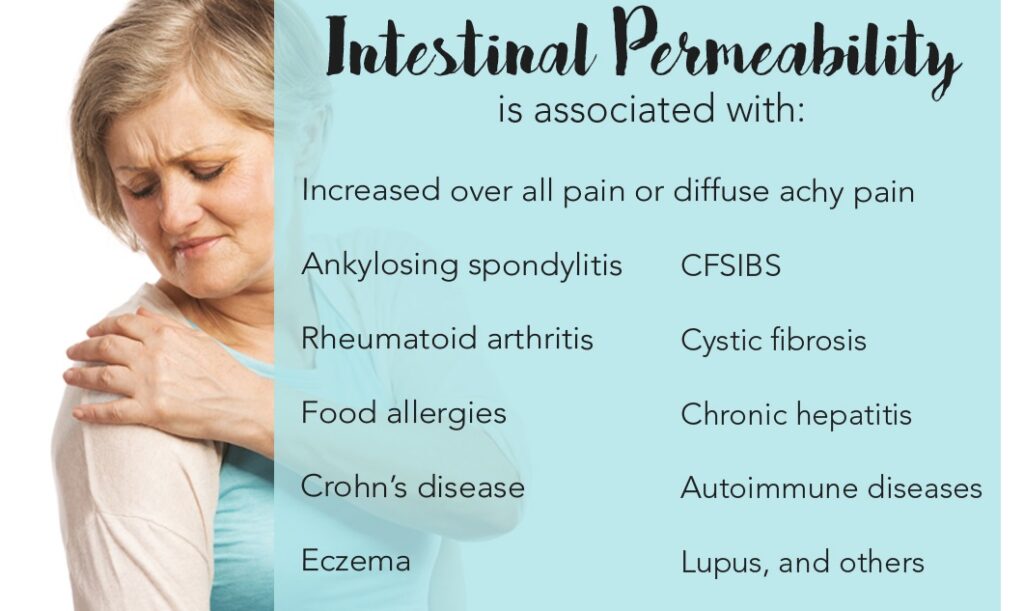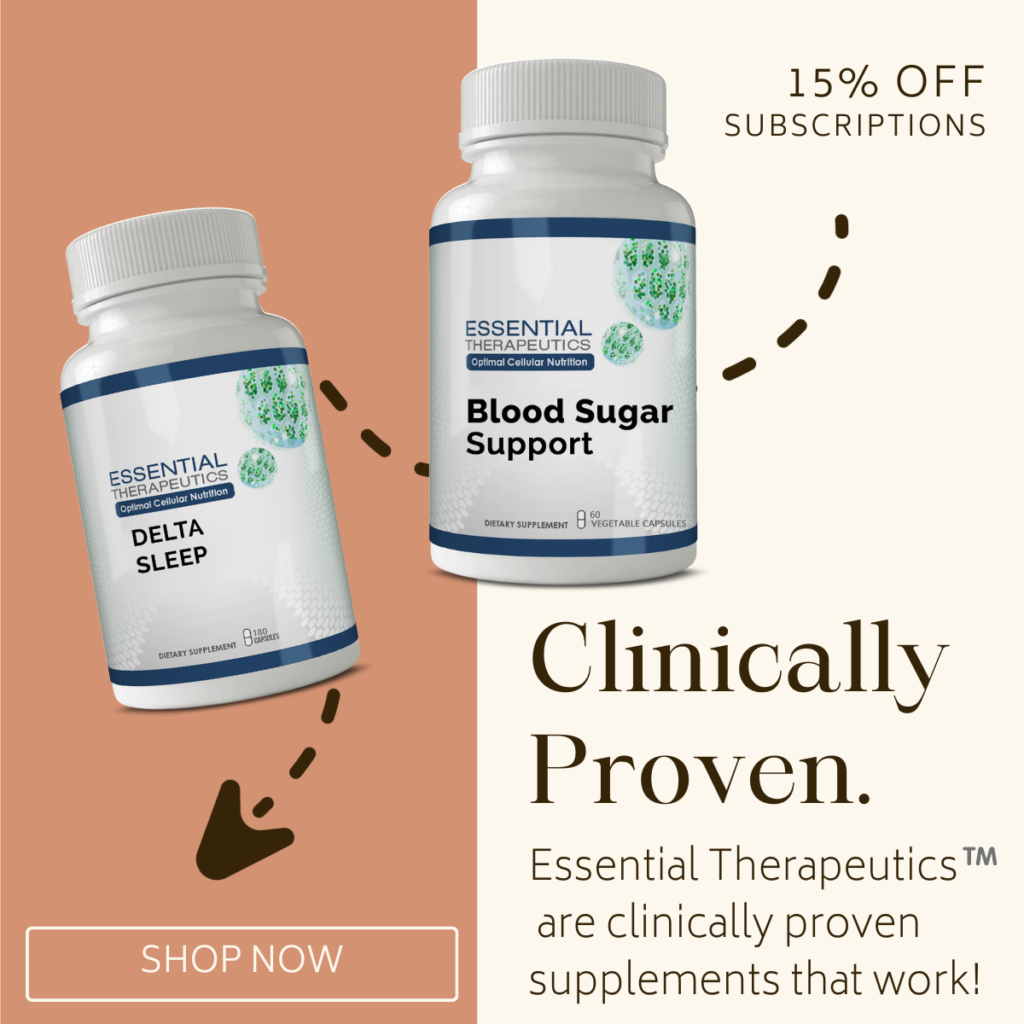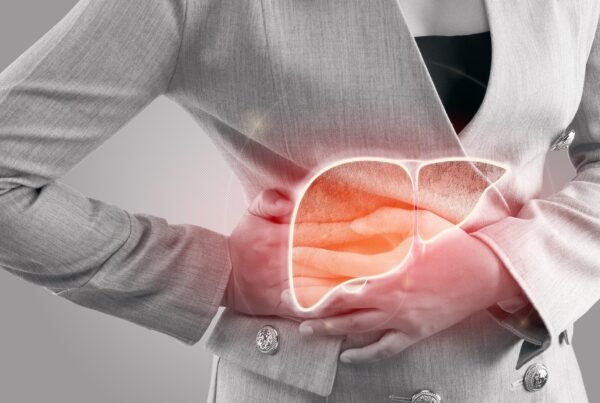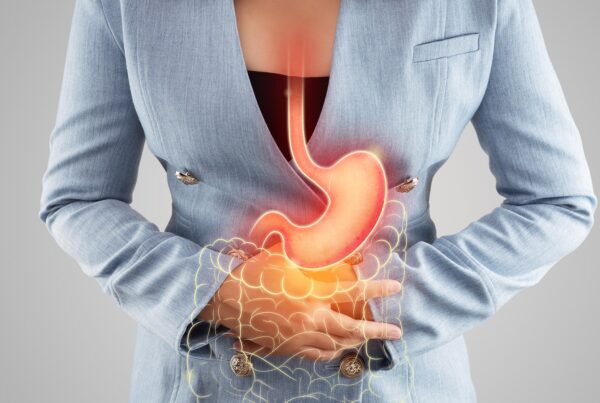Could your achy pain, fatigue, brain fog, low moods, food allergies, brittle nails, thinning hair, bloating, gas, stomach pain, IBS symptoms and or other chronic health problems be related to intestinal permeability?
You bet it could!
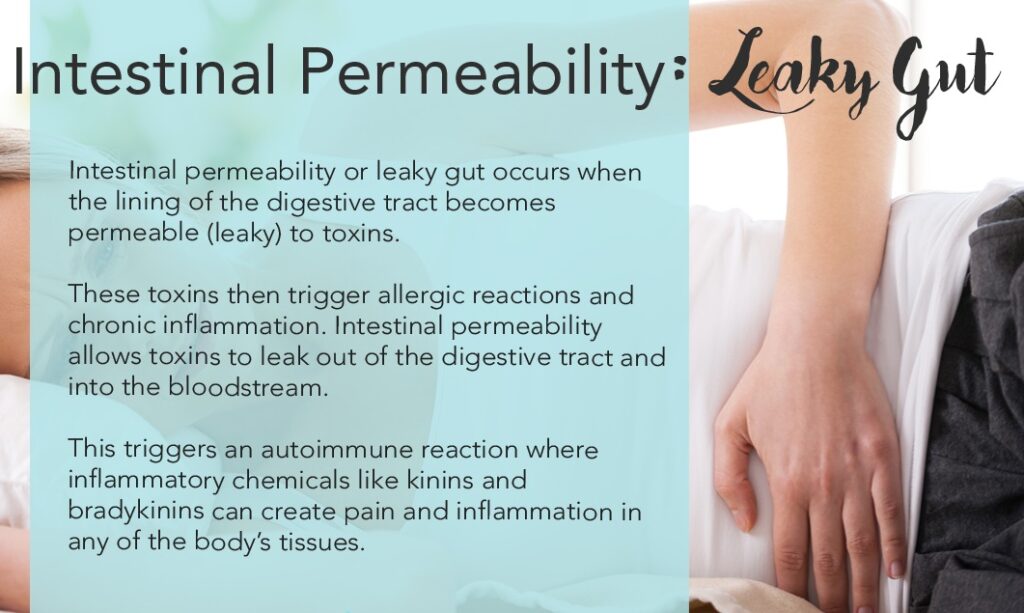
Most of my patients have poor digestion, malabsorption, and often take heartburn medications or worse NSAIDs. Many have been on numerous antibiotics or taken steroids-These drugs deplete your natural digestive enzymes.
Once you deplete your natural digestive enzymes, through poor diet or prescription drugs, you become at risk of developing malabsorption and leaky gut syndrome.
The use of non-steroidal anti-inflammatory drugs, steroids, antibiotics, antihistamines, too much caffeine and alcohol, and other prescription and nonprescription drugs renders the intestinal mucosa permeable to toxins and undigested food particles. This can then lead to allergic reactions resulting in pain generating chemicals.
NSAIDs – Pain Meds and Leaky Gut
Ibuprofen, a drug in the family of medications called Non-Steroidal Anti-inflammatory Drugs (NSAIDs), can cause what is often referred to as ‘leaky gut syndrome’ (LGS). This is thought to lead to stomach ulcers that can result in upper gastrointestinal bleeding, the need for surgery and blood transfusions.
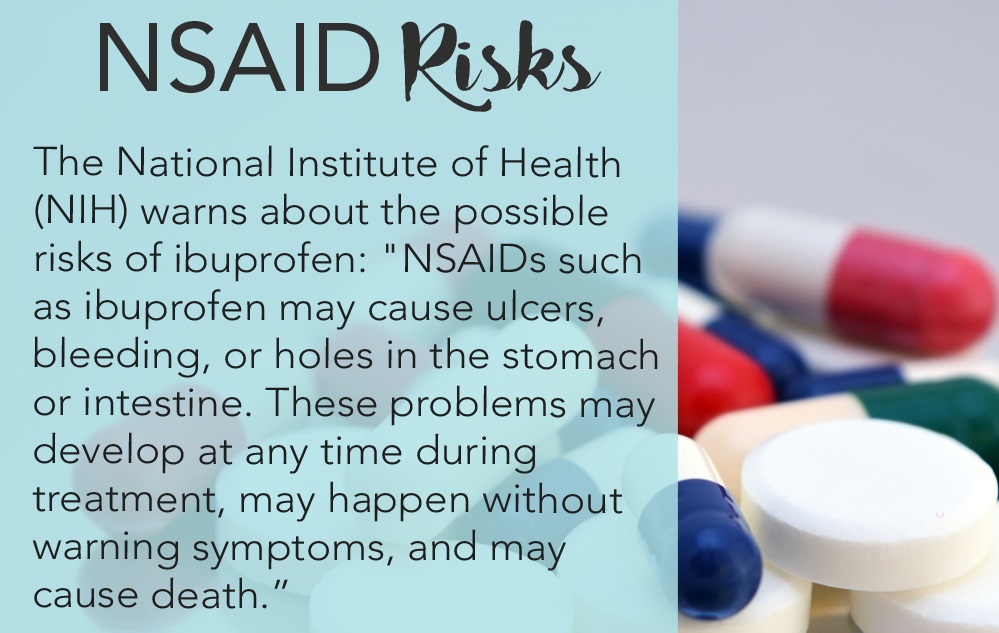
“The risk may be higher for people who take NSAIDs for a long time, are older in age, have poor health, or who drink three or more alcoholic drinks per day while taking ibuprofen.”
Another study by NIH concluded that NSAIDs weaken the intestinal walls and using these drugs for the long-term leads to inflammation of the small intestine.
Here’s a list of common NSAID medications:
- Advil / Motrin (ibuprofen)
- Aspirin
- Aleve (naproxen sodium)
- Celebrex
- Naprosyn (naproxen)
- Lodine (etodolac)
- Mobic
- Nalfon (fenoprofen)
- Daypro (oxaprozin)
- Ansaid (flurbiprofen)
- Cambia / Cataflam / Voltaren (diclofenac)
- COX-2 Inhibitors
Potential side effects of other NSAIDS:
These drugs deplete your natural sleep hormone melatonin-not good for those who struggle with sleep…
NSAIDs increase blood pressure. If you have high blood pressure consider stopping your NSAIDs for a few weeks and see if your blood pressure comes down.
A person taking NSAIDs is seven times more likely to be hospitalized for gastrointestinal adverse effects. The FDA estimates that 200,000 cases of gastric bleeding occur annually and that this leads to 10,000 to 20,000 deaths each year. NSAIDs more than double a person’s risk of developing high blood pressure, possibly leading to more medication. In one study, 41% of those who had recently started on medication to lower their blood pressure were also taking an NSAID.
To Treat and Beat leaky gut my patients are instructed on how to implement my elimination while taking the essential supplements to repair the gut.
I encourage people to go off dairy, gluten, sugar, corn, eggs, and nightshade foods. I encourage my patients on the elimination diet to go off all sugar and aspartame (Nutrasweet). I also encourage them to go off all soy products. A little soy is okay but that’s really become this whole idea that soy is really healthy, that the Asian countries eat a lot of soy. They eat some soy but they’re not drinking soy-milk on a daily basis. That’s been really blown out of proportion. Soy mimics estrogen; it bonds to estrogen receptors. While there’s a place for that, it can actually help with some menopausal symptoms and help regulate some irregularities of estrogen, but it also can create estrogen dominance which can lead to PMS, endometriosis, breast tenderness, fertility issues, fibroid tumors, and other unwanted hormonal imbalances. I encourage you to come off soy.
 I also encourage patients when they’re doing the elimination diet, to cut drastically back on their caffeine. They need to come off all sodas, especially anything with aspartame or [NutraSweet]. Coffee and tea are okay, but they need to come off sodas. The last thing I encourage my patients on elimination to do is to come off all nightshades. Nightshades are white potatoes, eggplant, red pepper, tobacco; these things have a certain alkaloid in them that when some susceptible folks eat them , they get inflammation. That oftentimes will manifest itself in their joints. I see that oftentimes with patients with rheumatoid arthritis, sometimes in Sjogren’s, sometimes in Lupus, but definitely rheumatoid arthritis. But it doesn’t have to be an autoimmune disease. It can be any type of pain. Typically you’ll see the pain in your hands, knees and feet; in your extremities. The only way to really know if you’re being affected, and I see a response for nightshades in about 30% of the people who try this. However if you’re one of the 30% and you find that eating white potatoes, a baked potato every couple of days, or eating eggplant or lot of red pepper, you find that by giving that up, you don’t have pain in your hands like you used to, which you used to attribute to osteoarthritis or rheumatoid arthritis-it’s certainly worth going off those foods, at least for the majority of the time.
I also encourage patients when they’re doing the elimination diet, to cut drastically back on their caffeine. They need to come off all sodas, especially anything with aspartame or [NutraSweet]. Coffee and tea are okay, but they need to come off sodas. The last thing I encourage my patients on elimination to do is to come off all nightshades. Nightshades are white potatoes, eggplant, red pepper, tobacco; these things have a certain alkaloid in them that when some susceptible folks eat them , they get inflammation. That oftentimes will manifest itself in their joints. I see that oftentimes with patients with rheumatoid arthritis, sometimes in Sjogren’s, sometimes in Lupus, but definitely rheumatoid arthritis. But it doesn’t have to be an autoimmune disease. It can be any type of pain. Typically you’ll see the pain in your hands, knees and feet; in your extremities. The only way to really know if you’re being affected, and I see a response for nightshades in about 30% of the people who try this. However if you’re one of the 30% and you find that eating white potatoes, a baked potato every couple of days, or eating eggplant or lot of red pepper, you find that by giving that up, you don’t have pain in your hands like you used to, which you used to attribute to osteoarthritis or rheumatoid arthritis-it’s certainly worth going off those foods, at least for the majority of the time.
The diet is done for one month.
After being off these products for 1 month, you typically find that you have more energy, are more clear headed, have less pain, and usually have lost some unwanted weight.
Then what you want to do is you add these foods back, one at a time. You’ve been off dairy for a month and what you want to do is when you come off the diet, you eat dairy 2-3 servings that day and then you go back on the diet for 3 days, because it may take 3 days before you have a reaction to dairy or to wheat, gluten, sugar or soy, whatever it is. You challenge it, 2-3 servings one day and then you go off that food for 3 days, because food allergies or food intolerances oftentimes are not immediate. Most of the time, in fact the majority of the time, they’re delayed sensitive reactions; they may take up to 72 hours.
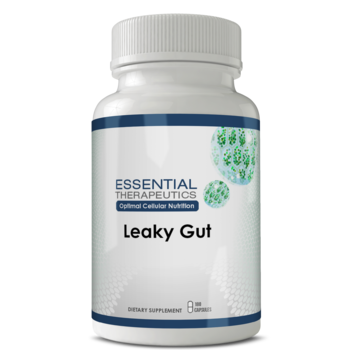 What you’ll find is oftentimes once you start adding back these foods that you’ve been off for a month, you may find that when you eat a lot of sugar one day, then the next day, you have a lot of fibro fog, low moods, your blood pressure goes up, you have loose bowel movement, or you feel run down. It could be that you add nightshades back; you get a bunch of potatoes one day, maybe you eat a baked potato and some French fries, some red peppers. Then 2-3 days later, you start getting the achy pain in your hands again that had gone away over the last month.
What you’ll find is oftentimes once you start adding back these foods that you’ve been off for a month, you may find that when you eat a lot of sugar one day, then the next day, you have a lot of fibro fog, low moods, your blood pressure goes up, you have loose bowel movement, or you feel run down. It could be that you add nightshades back; you get a bunch of potatoes one day, maybe you eat a baked potato and some French fries, some red peppers. Then 2-3 days later, you start getting the achy pain in your hands again that had gone away over the last month.
What you want to do is pay attention to these things. As they show up, if they’re real blatant then obviously you know that that food group triggered it.
If you just have some subtle things and you’re not sure, then wait a week or two and then challenge that food group again, and see yeah, I think that was making me feel kind of spacey for a day or so. Every time I have a lot of wheat, then I find that I’m a little bit spacey in my thinking. The only way to know that is to challenge that. Try the Elimination Diet and Essential Therapeutics Digestive Enzymes.
For my patients with leaky gut, I also use a product especially developed for intestinal permeability known as Leaky Gut Formula. It has all the essential nutrients to repair leaky gut.





